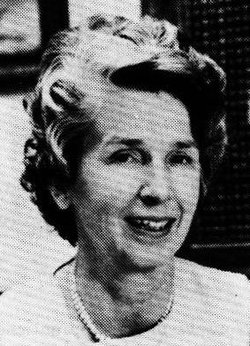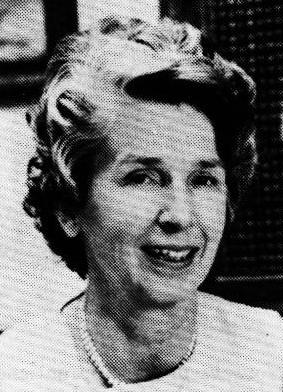Her death was announced by her son Roger Martindell of Princeton.
Her birth, her breeding and her iron-willed father seemed to have condemned Ms. Martindell to a life she later dismissed as utterly conventional — “I didn’t do anything real until I was 50,” she once told a reporter — but feminism and the 1960s changed all that.
Racing to make up for lost time, she carved out a career in New Jersey politics, serving as a state senator in the 1970s, and held posts in President Jimmy Carter’s administration, including that of ambassador to New Zealand. She also resumed her education at Smith College more than six decades after her freshman year, and in her 90s wrote her memoirs, published last month by Boxed Books. The book’s theme, neatly expressed by its author in two words, is carpe diem.
Anne Clark was born in 1914 in the Plaza Hotel in Manhattan. Her memoirs describe a pampered but miserable childhood. Her sickly, mentally unstable mother, the former Marjory Blair, was the heiress to a railroad fortune. Her cold and distant father, William J. Clark — an alcoholic, she later discovered — was a prominent lawyer who in 1938 became a judge for the United States Court of Appeals for the Third Circuit.
After attending private schools in Manhattan and Princeton, and boarding school near Baltimore, she entered Smith College in 1932.
Midway through her freshman year, she announced to her father that she intended to earn a degree and study law.
“He was a federal judge, and I thought it would please him,” she told a reporter for The New York Times in 2002. “But he was horrified.”
By parental decree, she dropped out of Smith, then married George C. Scott Jr., a stockbroker, with whom she reared three children: Marjory Luther of Ann Arbor, Mich.; George C. Scott III of Richmond, Va.; and David C. Scott of Princeton. The marriage ended in divorce after 13 years.
In 1948, she married Jackson Martindell, the publisher of Who’s Who and the father of her son Roger. In addition to her children, she is survived by a brother, J. William Clark, of Great Barrington, Mass.; nine grandchildren; and six great-grandchildren.
In the early 1960s, a friend persuaded her to teach an experimental reading class at a primary school in Princeton. A few years later, dismayed by the United States’ involvement in Vietnam, she began raising money for the 1968 presidential campaign of Senator Eugene J. McCarthy.
After Mr. McCarthy failed to win the nomination, she agreed to become the vice chairwoman of the New Jersey Democratic Party and worked to bring disaffected liberals back into the fold.
It was a sobering experience. “I was appalled at how women were treated in politics — good for making coffee and licking stamps, period,” she said.
In a genteel way, she pushed. Once, she arrived at an important meeting on party reform only to be told that she would not be allowed to participate, for her own good: She might be offended by the four-letter words the men used. Using one of her own, she made it clear that she did not give a darn, adding, “Now, let’s get in there and get to work.”
In 1972, Ms. Martindell was the state chairwoman for Senator George McGovern’s presidential campaign, and she led the New Jersey delegation to the Democratic National Convention, the only woman heading a state delegation. In 1973, Ms. Martindell won a seat in the New Jersey Senate from Mercer County, ousting a seemingly entrenched Republican incumbent. Her first act in the Senate was to prepare a resolution calling for the impeachment of President Richard M. Nixon.
In her four years as senator, during which time she and her husband separated, Ms. Martindell focused on women’s rights, education and the environment. She helped create the New Jersey Division on Women, one of the first state-level offices in the country that addressed exclusively issues affecting women, including job discrimination and domestic violence.
Her early endorsement of Jimmy Carter and her campaign work for him led to an appointment as director of the Office of Foreign Disaster Assistance of the United States Agency for International Development. In 1979, she was named ambassador to New Zealand and Western Samoa.
During her three years as ambassador, Ms. Martindell fell in love with New Zealand — and with one New Zealander in particular, Sir Mountford Tosswill Woollaston, a landscape painter better known as Toss, whom she later called “the love of my life.” He died in 1998.
Her devotion to New Zealand outlasted her tenure as ambassador. In 1986, disturbed at deteriorating relations between the United States and New Zealand, which had banned American nuclear submarines from entering its waters, she founded the United States-New Zealand Council to foster closer ties and better understanding. The council is still in operation.
In 1999, she returned to Smith, pursuing a major in American studies. She received her B.A. in 2002. On graduation day, Ms. Martindell, then 87, also received an honorary Doctor of Laws degree. At that time, she was the oldest graduate in Smith’s history.
She briefly considered going to graduate school.
“That would be a good ticket to a job, I suppose,” she said.
Her death was announced by her son Roger Martindell of Princeton.
Her birth, her breeding and her iron-willed father seemed to have condemned Ms. Martindell to a life she later dismissed as utterly conventional — “I didn’t do anything real until I was 50,” she once told a reporter — but feminism and the 1960s changed all that.
Racing to make up for lost time, she carved out a career in New Jersey politics, serving as a state senator in the 1970s, and held posts in President Jimmy Carter’s administration, including that of ambassador to New Zealand. She also resumed her education at Smith College more than six decades after her freshman year, and in her 90s wrote her memoirs, published last month by Boxed Books. The book’s theme, neatly expressed by its author in two words, is carpe diem.
Anne Clark was born in 1914 in the Plaza Hotel in Manhattan. Her memoirs describe a pampered but miserable childhood. Her sickly, mentally unstable mother, the former Marjory Blair, was the heiress to a railroad fortune. Her cold and distant father, William J. Clark — an alcoholic, she later discovered — was a prominent lawyer who in 1938 became a judge for the United States Court of Appeals for the Third Circuit.
After attending private schools in Manhattan and Princeton, and boarding school near Baltimore, she entered Smith College in 1932.
Midway through her freshman year, she announced to her father that she intended to earn a degree and study law.
“He was a federal judge, and I thought it would please him,” she told a reporter for The New York Times in 2002. “But he was horrified.”
By parental decree, she dropped out of Smith, then married George C. Scott Jr., a stockbroker, with whom she reared three children: Marjory Luther of Ann Arbor, Mich.; George C. Scott III of Richmond, Va.; and David C. Scott of Princeton. The marriage ended in divorce after 13 years.
In 1948, she married Jackson Martindell, the publisher of Who’s Who and the father of her son Roger. In addition to her children, she is survived by a brother, J. William Clark, of Great Barrington, Mass.; nine grandchildren; and six great-grandchildren.
In the early 1960s, a friend persuaded her to teach an experimental reading class at a primary school in Princeton. A few years later, dismayed by the United States’ involvement in Vietnam, she began raising money for the 1968 presidential campaign of Senator Eugene J. McCarthy.
After Mr. McCarthy failed to win the nomination, she agreed to become the vice chairwoman of the New Jersey Democratic Party and worked to bring disaffected liberals back into the fold.
It was a sobering experience. “I was appalled at how women were treated in politics — good for making coffee and licking stamps, period,” she said.
In a genteel way, she pushed. Once, she arrived at an important meeting on party reform only to be told that she would not be allowed to participate, for her own good: She might be offended by the four-letter words the men used. Using one of her own, she made it clear that she did not give a darn, adding, “Now, let’s get in there and get to work.”
In 1972, Ms. Martindell was the state chairwoman for Senator George McGovern’s presidential campaign, and she led the New Jersey delegation to the Democratic National Convention, the only woman heading a state delegation. In 1973, Ms. Martindell won a seat in the New Jersey Senate from Mercer County, ousting a seemingly entrenched Republican incumbent. Her first act in the Senate was to prepare a resolution calling for the impeachment of President Richard M. Nixon.
In her four years as senator, during which time she and her husband separated, Ms. Martindell focused on women’s rights, education and the environment. She helped create the New Jersey Division on Women, one of the first state-level offices in the country that addressed exclusively issues affecting women, including job discrimination and domestic violence.
Her early endorsement of Jimmy Carter and her campaign work for him led to an appointment as director of the Office of Foreign Disaster Assistance of the United States Agency for International Development. In 1979, she was named ambassador to New Zealand and Western Samoa.
During her three years as ambassador, Ms. Martindell fell in love with New Zealand — and with one New Zealander in particular, Sir Mountford Tosswill Woollaston, a landscape painter better known as Toss, whom she later called “the love of my life.” He died in 1998.
Her devotion to New Zealand outlasted her tenure as ambassador. In 1986, disturbed at deteriorating relations between the United States and New Zealand, which had banned American nuclear submarines from entering its waters, she founded the United States-New Zealand Council to foster closer ties and better understanding. The council is still in operation.
In 1999, she returned to Smith, pursuing a major in American studies. She received her B.A. in 2002. On graduation day, Ms. Martindell, then 87, also received an honorary Doctor of Laws degree. At that time, she was the oldest graduate in Smith’s history.
She briefly considered going to graduate school.
“That would be a good ticket to a job, I suppose,” she said.
Family Members
Sponsored by Ancestry
Advertisement
See more Martindell or Clark memorials in:
- Trinity All Saints Cemetery Martindell or Clark
- Princeton Martindell or Clark
- Mercer County Martindell or Clark
- New Jersey Martindell or Clark
- USA Martindell or Clark
- Find a Grave Martindell or Clark
Explore more
Sponsored by Ancestry
Advertisement







